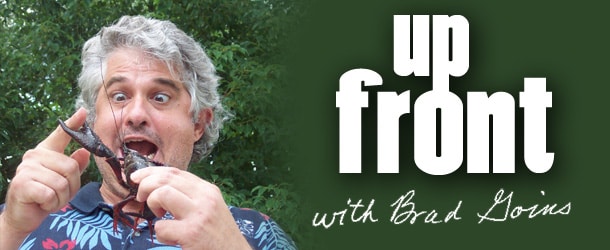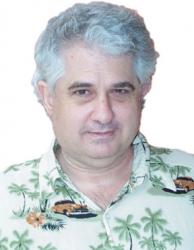The SWLA Music School’s distinctively named Swiss Army Knife Recording Camp will give youths 11 to 17 a rare opportunity to be taught how to make and record their own music with simple computerized devices.
Students will learn the basics of recording their music using their iPad and the Garageband app. (Some other tablets and apps are permissible; students should check first.) Students will learn recording tricks and techniques and get tips for songwriting and arrangement.
Students will also learn how to publish their own music and post it to such sites as Soundcloud, Spotify, and iTunes. Tuition for the five-day camp is $175. Dates and times are July 22 through 26, 9 am to 3 pm. For info, call 513-7905.
First Pulitzer For The Advocate
When Louisiana voters decided some months ago that Louisiana defendants could no longer be found guilty if the jury was less than unanimous, I thought the state had taken a step in the right direction. But I didn’t really see the vote as a major state story. Perhaps that was my mistake, as the story did receive extensive nationwide coverage. But I think that coverage may have had less to do with Louisiana and more with the fact that Oregon still allows prisoners to be found guilty even if the jury is not unanimous. (It is the last state to do so.)
Still, some people at The Advocate wrote a series of reports that certainly made the vote sound like a very big deal. The result was the first Pulitzer Prize for The Advocate in its 177-year history.
The Advocate’s five-part special report on the vote, titled “Tilting the Scales,” debuted on April 1, 2018. It was written by Gordon Russell, Jeff Adelson, Jim Mustian and John Simerman. For Russell, this Pulitzer is his third. I imagine he is carrying his head pretty high in the Advocate news room these days.
In the 2006, The Times-Picayune received two Pulitzer Prizes for its coverage of Hurricane Katrina.
The Pulitzers were originally endowed by Joseph Pulitzer, a 19th-century Hungarian immigrant and U.S. newspaper owner. They have been awarded since 1917 by Columbia University.
Pouring Paint
The Gallery by the Lake at 106 W. Pryce St. routinely offers classes about how to make all sorts of art — water colors, oil, acrylics and so forth. But one session in the Gallery’s ongoing Second Saturday Workshops focuses on a kind of art-making that’s highly unusual these days.
On July 13, Chris Broussard will lead a workshop titled “Pour Your Painting.” Back in the 1950s, when Jackson Pollock was the country’s most famous painter, he did, in fact, make art works by pouring paint out of industrial paint cans onto huge canvasses he’d spread on the floor. Pollock’s way of making art, which critics called “action painting,” is remembered mostly by art historians now. But it was all the rage 60 years ago.
Broussard may teach students a bit about what Pollock was onto. And if he doesn’t, he’ll certainly teach them a novel way to make art.
The “Pour Your Painting” workshop will take place July 13, 10 am to 2 pm. Fees are $30 for members of the gallery and $35 for non-members. Participants are invited to bring their lunch. To learn more, visit gallerybythelake.com.
Pizzolatto’s SWLA
My undergraduate minor was in theater. And I wrote my honors thesis on the three playwrights Stéphane Mallarmé, Maurice Materlinck and Samuel Beckett. But my favorite play is the screenplay for the first season of True Detective, which was written by Lake Charles born and bred Nic Pizzolato.
I don’t know why I’m just now getting around to reading the Jan. 19 interview of Pizzolatto in Bayou Brief. In the interview, Pizzolatto talks a lot about what it was like to film True Detective in Louisiana and the Louisiana tax credits for filmmakers that existed at the time. (You may recall that much of True Detective was set in Lake Charles. Whether those parts were actually filmed here or in sets located elsewhere, I haven’t been able to determine.)
In the interview, Pizzolatto talks a fair amount about the home he left when he was a young man.
“Rural Southwestern Louisiana means something to me because it’s where I grew up, and its imagery and culture stayed inside me long after I left. So a lot of dense layering — materially, visually, thematically — was not only possible, but very personal to me. I think, too, these areas are part of the wide ‘unknown’ America — the fly-over places where economic and cultural gulfs are waiting to be explored.”
At one point, the interviewer, journalist Lamar White, Jr., says to Pizzolato, “the Louisiana in … True Detective … is not the Louisiana most people from outside of the state are familiar with. Do you think this is because you’re from Lake Charles — a part of the state very rarely written about? Or is it reflective of a larger impulse? A way of illuminating by demystifying?”
Pizzolatto responds, “I guess the answer I would provide is that I am interested in demystifying and seeing a place and people clearly, but that I see such a compulsion as the only way we honor anything; the only way we honor reality — to attempt seeing it unvarnished and then to love it or not.”
The interview isn’t a very long one. But if you’re as taken with Pizzolatto’s writing as many are these days, you may want to read it anyway. To do so, just visit bayoubrief.com and click the “Culture” tab at the top of the page.
Big Doings About Almond Milk
With major budget issues off the table in this session of the Louisiana Legislature, there’s a lot more time for somewhat less important issues to be bandied about.
For example, one state Sen. Francis Thompson, D-Delhi, is hell-bent for leather that almond milk should not be called almond milk in Louisiana. He feels the same way about soy and rice milk. Delhi says that in Louisiana, only liquids that come from animals should be called milk.
He has other strong ideas about what food in Louisiana should be called. For instance, says Delhi, no food made from plants should be referred to as meat, “meat product,” poultry or pork. Likewise, he doesn’t think that cauliflower rice should be called what it is. It doesn’t have rice in it. It should be called cauliflower something else.
All this is in Senate Bill 152.
The Advocate notes that Delhi is “very close to many members of Louisiana’s agricultural lobby” and “a big booster of farmers and the agricultural industry.”
In the last edition of Jeremy Alford’s column for Lagniappe, Alford quoted Delhi as saying, “not that the almond milk is not a tasty thing, I hear; but nothing is better than cows’ milk.” Nothing? I wonder whether Delhi is being 100 percent up front here. I mean, when he goes to Ruth’s Chris Steak House, does he order the steak or just stick with the milk?
There’s More Than One Song
Another burning issue hanging in the balance this legislative session is whether Hank William’s “Jambalaya (On the Bayou)” should be declared the official state song.
Alford also quoted a Louisiana politician who was worked up about this matter. State Sen. Norby Chabert, R-Houma Tweeted, “I mean … How is it not already?”
I can think of at least one reason. The song “You Are My Sunshine” was written by Jimmie Davis, who twice served as governor of Louisiana. At his 1944 campaign rallies, Davis spent a lot of time singing “Sunshine” while he rode on his horse, who was named Sunshine.
“You Are My Sunshine” is surely on the short list of songs we think of first when we think of Americana or American roots or folk music. It’s about as uptempo as music gets, and would be likely to make the citizens of any state feel pretty chipper.
Known as “The Singing Governor,” Davis put six songs in the Top 20 country charts — five when he was in the Louisiana Governor’s Mansion. Davis, who lived to be 101, was still performing in the 1990s. It’s not a bad little story.
















Comments are closed.